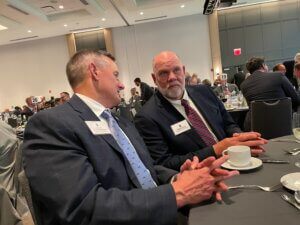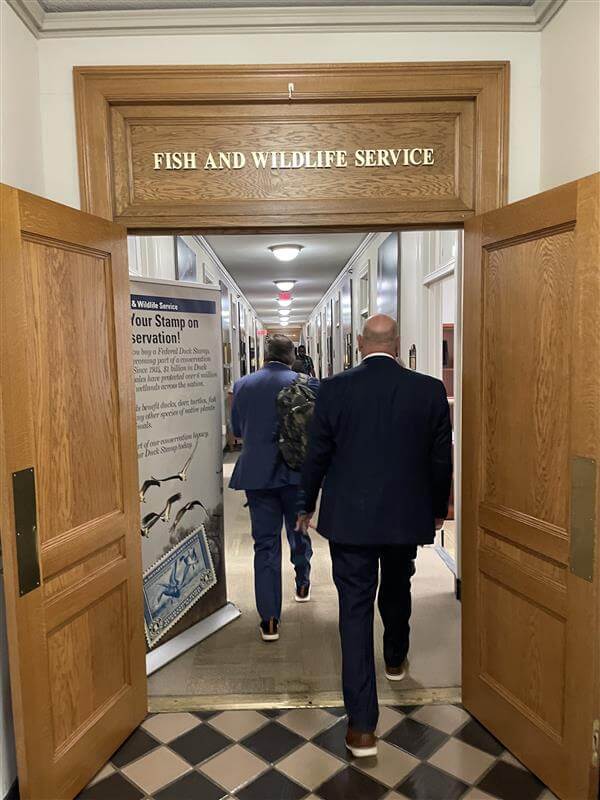To borrow an athletic term, it was like a track meet for the Rocky Mountain Elk Foundation delegation during a recent trip to Washington, D.C. RMEF leadership spent more than two days attending nonstop, face-to-face meetings, gatherings and other events.
“It is absolutely invaluable to spend time with policymakers, staffers and administration officials to intimately talk about conservation and natural resource issues related to our mission and legislative priorities, and especially to do so on their turf,” said RMEF Chief Conservation Officer Blake Henning.
Henning along with RMEF President and CEO Kyle Weaver and RMEF Director of Government Affairs Ryan Bronson made stop after stop across the Capitol Hill complex. It began with attendance at the 36th Annual Congressional Sportsmen’s Foundation (CSF) Banquet and Auction. RMEF is a sponsor of CSF, which has the largest bipartisan caucus in Congress and is committed to protecting America’s sporting traditions and conservation heritage.
RMEF shared a table (see photo below) with Rep. Bruce Westerman (R-AR), who serves as chair of the House Committee on Natural Resources and co-chair of the Congressional Sportsmen’s Caucus, among other duties and assignments. Others at the RMEF table included officials from the Department of Interior and Bureau of Land Management. The group talked about many topics ranging from the Land and Water Conservation Fund to wild horses and burros.

At the banquet, CSF honored legendary NASCAR driver and owner Richard Childress by presenting him with the Dingell-Young Sportsmen’s Legacy Award, CSF’s highest honor for long-standing dedication to hunting, fishing, conservation and promoting outdoor heritage. Childress is an RMEF Life Member. He received the award from Bass Pro Shops Founder Johnny Morris, friend and fellow longtime RMEF supporter. A photo displayed on the big screen during the presentation showed Childress wearing a throwback RMEF Team Elk hat.
“The outdoors has always been part of who I am, whether it’s hunting, fishing or simply being a steward of the land,” said Childress. “This recognition isn’t just about me, it’s about ensuring future generations can enjoy the same freedoms, access and connection to the outdoors that we’ve been blessed with. I’ll continue doing everything I can to carry that legacy forward.”
In total, the RMEF delegation took part in 13 scheduled meetings and dozens of informal conversations across Capitol Hill.
The Endangered Species Act, migration corridors, national wildlife refuges and public access were topics discussed with U.S. Fish and Wildlife Service Director Brian Nesvik. When meeting with U.S. Forest Service Chief Tom Schultz, the group talked about staffing, reorganization, the Roadless Rule repeal, active forest management, wildlife disturbance and maintenance costs to the agency.
RMEF was busy on the congressional front, too, emphasizing bipartisan outreach. It met with House Natural Resources Committee staff from both parties, including both chairmen and ranking members. RMEF also prioritized meeting with Colorado lawmakers, who live in a state with the largest elk population, to talk about active forest management and the Fix Our Forests Act, a measure ranking among RMEF’s highest current legislative priorities.
As it made the rounds, the RMEF team thanked all members of Congress that helped defeat an effort earlier this summer to sell public lands. Another point of emphasis was reviving momentum for the Wildlife Movement Through Partnerships Act. The legislation has bipartisan support and would codify in statute Secretarial Order 3362, which served as the basis of migration work for several years.

(Photo credit: Rocky Mountain Elk Foundation)